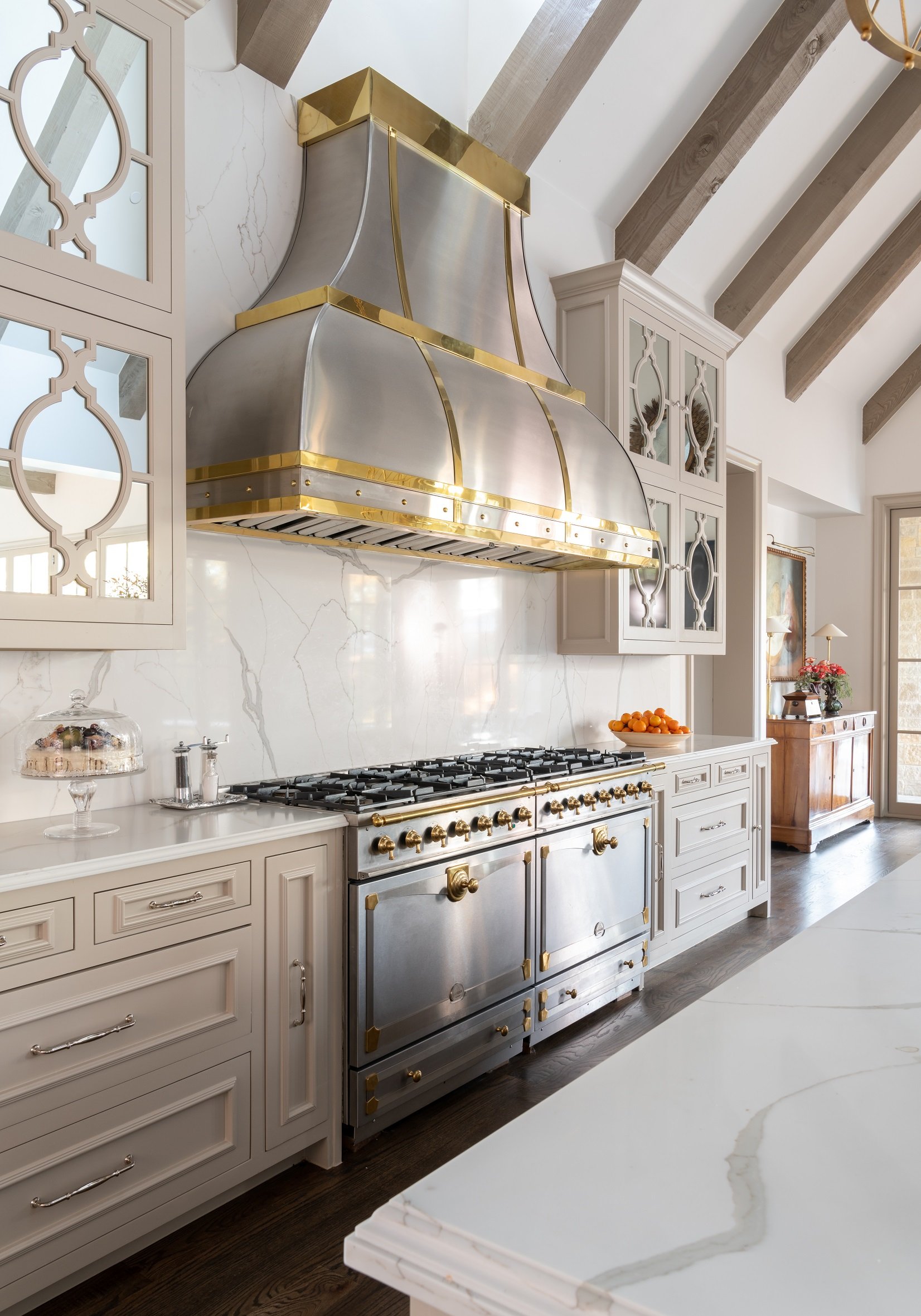This backsplash around the window in this catering kitchen is made of the same marble that we used for the countertops.
Although kitchen backsplashes have a functional purpose—protecting walls from water, grease stains, mold, and mildew—these days, they are also treated as an important design element. After all, the backsplash is right on the wall, so a visitor’s eyes naturally rest there. Despite the fact that backsplashes can make great focal points, many Dallas homeowners save picking their backsplash tiles for last.
Your kitchen design will look more impressive if you pick your backsplash tile early on and design around it. For those of you who are designing a new home or planning on remodeling your current kitchen, you should find the following tips useful.
A backsplash should cover the wall space between the countertop and upper cabinets above your range. Lately, I’ve noticed that the newest trend is to have the backsplash continue up beyond the upper cabinets, sometimes even up behind the vent hood. To figure out how much square footage of tile you’ll need, multiply the width of your wall by the height. Then, increase that number by ten percent just to make absolutely sure you’ll have enough.
When possible, we like to continue the backsplash behind the vent hood, like in this example from a Dallas kitchen.
Ceramic, stainless steel, porcelain, and stone backsplashes are great against oil and grease. Glass tile is perfectly water-resistant, so if you create a lot of steam when you cook, that’s something to consider. You should also think about how much maintenance you’re willing to accept for your backsplash. Ceramic tile doesn’t need to be resealed, but natural stone will.
Even if you’re saving money on your tile choice, don’t cut corners with your grout choice. You need a high-quality grout to make sure the tiles stay on the wall over time. Most tile backsplashes have a grout joint size of one-eighth of an inch, but sizes of up to a quarter inch are also possible.
Since replacing tile is expensive, you can never be too careful making your choice. Purchase a lot of different tile samples to take home (it’s cheaper than buying a lot of the wrong tile), then tape them to your wall and leave them up for a while. You can see how the color shifts as the lighting changes through the day.
Subway tile, like the gray tile we used in this bar area, is a classic choice for kitchen backsplashes.
Recently, my design firm has been using the same material for both the countertop and kitchen backsplash. Whether you use the same material or not, try not to create too much contrast between the two surfaces. For example, if your countertops are a cool gray, your backsplash should also be in a cool color.
The gray and terracotta colors in this mosaic tile backsplash match other colors we used in this Kessler Park home.
Mosaic tile patterns often incorporate multiple colors, allowing you to pick up on some of the other accent colors you’re using in the kitchen. If you have countertops with a unique pattern or color running through them, it’s a good idea to pick a neutral backsplash tile so you don’t draw attention away from your countertops. Of course, if your countertops are understated, you have more room to be creative and showy in your backsplash tile choice.
Choosing a timeless backsplash is important if you’re planning on selling your house. White subway tile is one option, but also consider penny tiles, picket tiles, square tiles, or hexagon tiles. White subway tile is also perfect for kitchens that have a lot going on, visually. Although it’s normally laid out in a brick pattern, a newer trend is to lay the tiles diagonally or vertically. Another thing to keep in mind is that larger tiles tend to look more contemporary, while smaller tiles feel more traditional.
Although there is no one-size-fits-all solution to finding the perfect backsplash, some tile choices will work in your kitchen better than others. By taking into account your budget, your lifestyle, and the rest of your kitchen’s aesthetic, you can easily narrow down your selections.
We used this fireplace screen with animal figures as a kitchen backsplash. It helps to complete the farmhouse theme.
Designers like myself also have established relationships with showrooms which gives us more leeway to request a tile and then return it on short notice. A designer can be a great resource whether you are just beginning your kitchen design project or nearing the end. If you'd like to work with us, you can reach us by calling our Dallas office at 214-232-9501 or sending an email to info@chambersinteriors.com.





